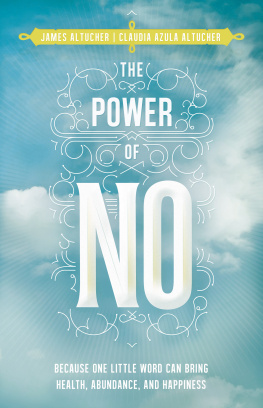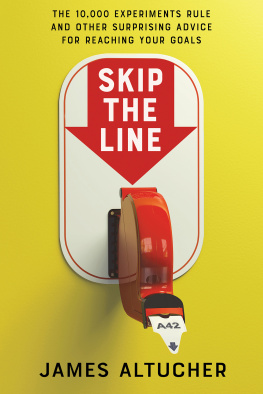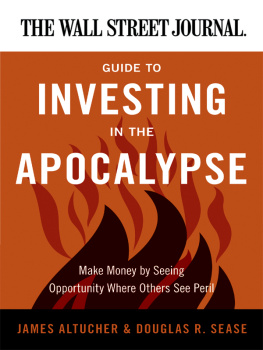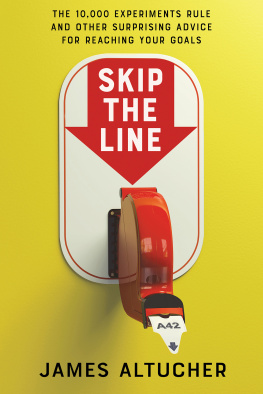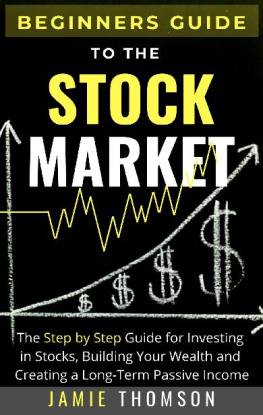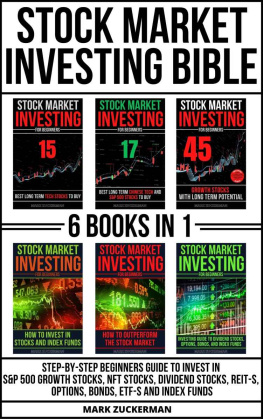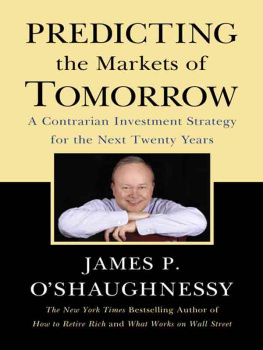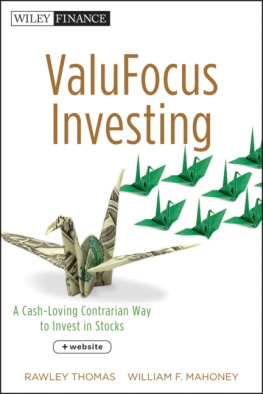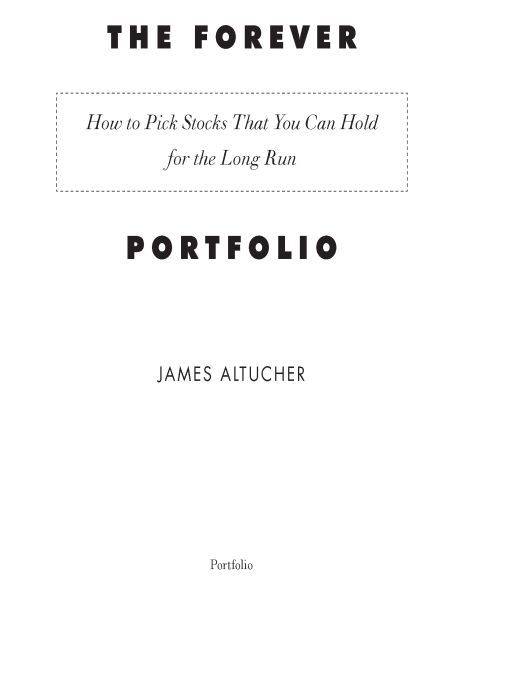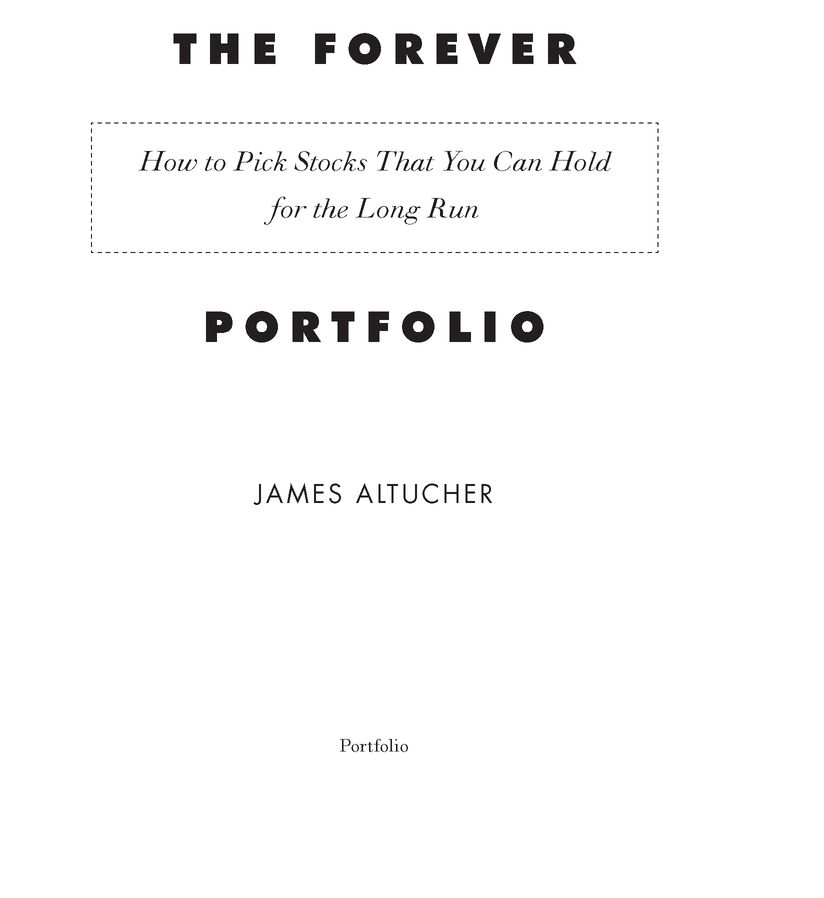Table of Contents
To Josie and Mollie
FOREWORD
If you are anything like me, you will love how James Altucher thinks, you will love what he has to say, you will love the tone of his writing, and you will end up loving James Altucher himself.
But that alone would not be a reason to read his book. There are a lot of lovable people in the world. (Well, maybe not as many as there used to be, but still...) There are also a lot of very smart people, particularly in the world of finance, and James is certainly among them. What strikes me as most noteworthy about James is that he combines a high level of intellectual firepower with an even higher level of common sense. He is a good thinker in part because he refuses to overthink. Also, his brain seems configured to generate the kind of insights that seem obvious in retrospect but which none of the other geniuses manage to notice. Do you know the story about the economist and the $20 bill? It goes like this: An economist is walking down the street with a friend, and the friend spots what looks like a $20 bill lying on the sidewalk. The economist, knowing what he knows about market efficiencies, blithely disabuses his friend: It cant be a $20 bill. If it were, somebody else would have already picked it up.
James Altucher, meanwhile, would have just picked up the $20 and gone on his way, a bit richer and a bit happier. Or, as he writes in The Forever Portfolio, You dont need to know advanced physics to see the color of a rainbow. James finds the silver lining in all sorts of clouds but, just as important, he also seems to know when a sunny sky is about to cloud over.
This book is putatively about global demographic trends over the next fifty years and how to wisely invest in them. Indeed, it does cover that ground. But it does more. It encourages you to think creatively, wisely, and sanely about investing, an arena in which creativity, wisdom, and sanity are often in short supply. James is especially good at making silk purses from sows ears. He finds the upside in identity theft, obesity, bot armies, and traffic fatalities. Some may grumble that he is ghoulish, preying on American vices and weakness in order to profit. That is a moral argument best addressed in a different sort of book than this one. What I will say about James personally is that he is a good and kind man, humane, a mensch even.
This does not mean he is without his flaws. Hardly. Fortunately, this also makes for good reading. Although this book is full of actual facts and reality-based information, it is the personal writing, peppered in amid the rest, that is my favorite. His gambling stories are particularly good, but so are his stories about how to generate useful ideas.
I met James several years ago while writing a book about the psychology of money. He was easily the most captivating character I had run across. (Sadly, that book got put in a drawer; reading The Forever Portfolio made me want to pull it out again.) James was just coming out of a funk, having made a great deal of money and then, in a spectacular sort of psychological hara-kiri, losing most of it. We first started talking in the huge Tribeca loft he had bought for his family and which hed soon be forced to sell. The building had once housed a sailcloth factory. Although the Altuchers had done a state-of-the-art renovation, the place was still so cavernous that you could well imagine it a century earlier, teeming with a sweaty crew of Portuguese or Italians as they wrestled bolts of canvas onto the cutting frames. How quaint it now seemed: the idea that riches were once made in the manufacture of something as prosaic as ships sails. The Altuchers wondrous apartment stood as a capitalist testament to how many means there are to fortune-making, and how quickly those means can change.
The Forever Portfolio represents everything that James Altucher learned from his own reversal of fortune, and everything he has learned since. There is almost nothing in this book that isnt thought provoking. I hope you read it with the same pleasure that I did.
Stephen J. Dubner,
coauthor of Freakonomics
INTRODUCTION
I dont like to worry. This seems like an obvious statement, hardly worth mentioning in the first lines of a substantial investing book. But the reality is, most people do like to worry. They worry about their investments on a day-to-day basis. They worry about their weight, even though minute by minute theres almost nothing they can do to change it. They worry about what their boss thinks of them, or they overanalyze the latest e-mails from colleagues, superiors, boyfriends, or girlfriends. People stay up late at night worrying, or they wake up in the middle of the night, plagued by whatever is on their minds.
The human brain has an urge to be active, and in the absence of anything important, the mind creates things to fill the space. These thoughts cover the spectrum, from fretting about a possible terrorist attack to worrying about money, retirement, the health of ones parents, and so on. And these thoughts could easily be those of a twenty-seven-year-old.
Ill give you a specific example. In 1999, I was buying an apartment. It was during the height of the tech boom, and I was flush with illiquid paper trading at fairly lofty values. I thought I was rich. I found a beautiful 4,500-square-foot loft with roof access. The real-estate broker showed me a few more places, but I was hooked on that initial apartment. As a last check the box moment I asked my broker, Nancy, one final thing: What happens if terrorists blow up the building next door?
You cant live your life that way, Nancy, being the good sales-woman she was, replied. And she was right. Life is short, and the only way we can enjoy it and the relatively few moments we are all given is to not spend them anxious and nervous, constructing fictional scenarios that can drive us crazy. Unfortunately, as it turned out, terrorists did blow up the building next door: The apartment I bought was right next to the World Trade Center. Nothing could alleviate the tragedy that engulfed the families of the victims of the attacks, and the entire neighborhood was completely submerged in the aftermath. Everyone was affected. Lives were lost, the financial markets plunged, and businesses and investment capital were put on hold for years.
The scars of that day of infamy are so deep, it is fair to say that the nation never really recovered. But the great thing about a global economy is that it does recuperate as opportunity finds its way back into the financial system. The key to investing, then, is staying in the game, consistently looking for opportunity and not worrying about all of those things that are meaningless or out of your control.
Why start a book on investing with this discussion of worry? Because this book is not about how to get rich or how to achieve 100 percent returns or whatever it is that most investment books are about. This book is about how to eliminate the distractions so that you can make sound investment decisions, rest easy, and enjoy all of the other aspects of your life. You dont want to have to look at your investments every day for the rest of your life. You dont want to have to follow every tick of the markets or panic if they plunge 10 percent in a week, as they often do.
You want to make long-term bets that will pay off handsomely over the long run because of overwhelming demographic trends and other factors that will be explained in this book. You want to cash in on the trends that will overtake the investment world like a tidal wave. Remember, tidal waves are there for us to surf on top of, not be drowned by.


